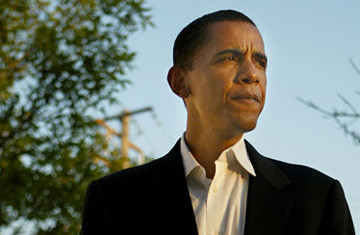
Obama at the Chicago Red Cross headquarters earlier this month
For his first eight months in the Senate, if you asked anyone why Barack Obama kept such a low profile, the answer was always the same: "He's taking the Hillary approach." Just as Hillary Clinton kept out of the spotlight after taking office to much fanfare, Obama, a star of last year's Democratic convention, has spent most of his time in Illinois, and out of the headlines. While he did appear on Oprah Winfrey's television show in January, he has focused his energy on local issues like veterans' benefits and has deferred to his more experienced colleagues on the big political fights. "What Sen. Clinton did when she first came in was what any person would do when they come into a new environment, that is listen and learn before you speak and you act," Obama told TIME in June. "I have tried to follow that same wisdom."
Now, Obama is breaking out. As the only African-American member of the Senate, Obama has faced some private grumbling for not joining the Congressional Black Caucus in challenging the electoral results in 2004 in Ohio. (Civil rights groups complained that African-American voters there faced long lines and other problems casting their ballots.) But after Hurricane Katrina, Obama toured the devastated areas with Presidents Bill Clinton and George H.W. Bush and then appeared on CBS's Face the Nation and ABC's This Week to blast the federal government's sluggish response and highlight the racial and economic gaps it exposed. The interviews marked his first appearances on the Sunday morning political shows since taking office. "It was a moment I thought I might add a useful perspective to the debate," Obama told TIME this week.
Last week, he strongly criticized a proposal, made by a bipartisan commission led by Jimmy Carter and former Secretary of State James Baker, to require photo ID for people to vote. Obama worried that the measure might stop poor people who don't have driver's licenses from voting. Then, he headed to the Senate floor to declare his opposition to John Roberts's appointment as chief justice, citing his concerns about how Roberts would vote on civil rights and abortion.
And yet Obama has not strayed far from the strategy of the more famous senator from Illinois. (Clinton grew up in a Chicago suburb.) Clinton makes a point of appearing at small-town New York events, like the start of apple-picking season, and maintains nine different offices in her adopted state. Except for the three days each week the Senate is in session, Obama is almost religiously in Illinois, and his staff brags about the 34 town halls he has held in his home state. Clinton frequently joins Republicans like Rick Santorum, a darling of the religious right, to work on legislation on the rare issues where they agree. (One recent bill provides $90 million to research the effects of video games on the cognitive development of children.) Obama is now working with Oklahoma Sen. Tom Coburn, one of the chamber's most conservative members, to demand that President Bush appoint someone to act as a chief financial officer to oversee Katrina spending. Clinton, who focused mainly on domestic policy issues before she entered the Senate, has emerged as a key player on defense issues; Obama is expanding his horizons with foreign policy. When Katrina hit, Obama was on his first major foreign trip as a senator, a ten-day visit to Russia, Ukraine and Azerbaijan, where he joined Republican Richard Lugar to learn about efforts to dispose of nuclear weapons from the former Soviet Union.
What's next for Obama? Continued work on his Katrina initiatives and nuclear non-proliferation, as well as some new ideas for education. Today, he and Clinton will jointly announce legislation intended to reduce medical errors and malpractice costs. And while he may not be as loud as he has been in the last few weeks, Obama is looking for other opportunities to make his mark — selectively. "If an issue of justice or equality is at stake," he says, "I will speak out on it."
